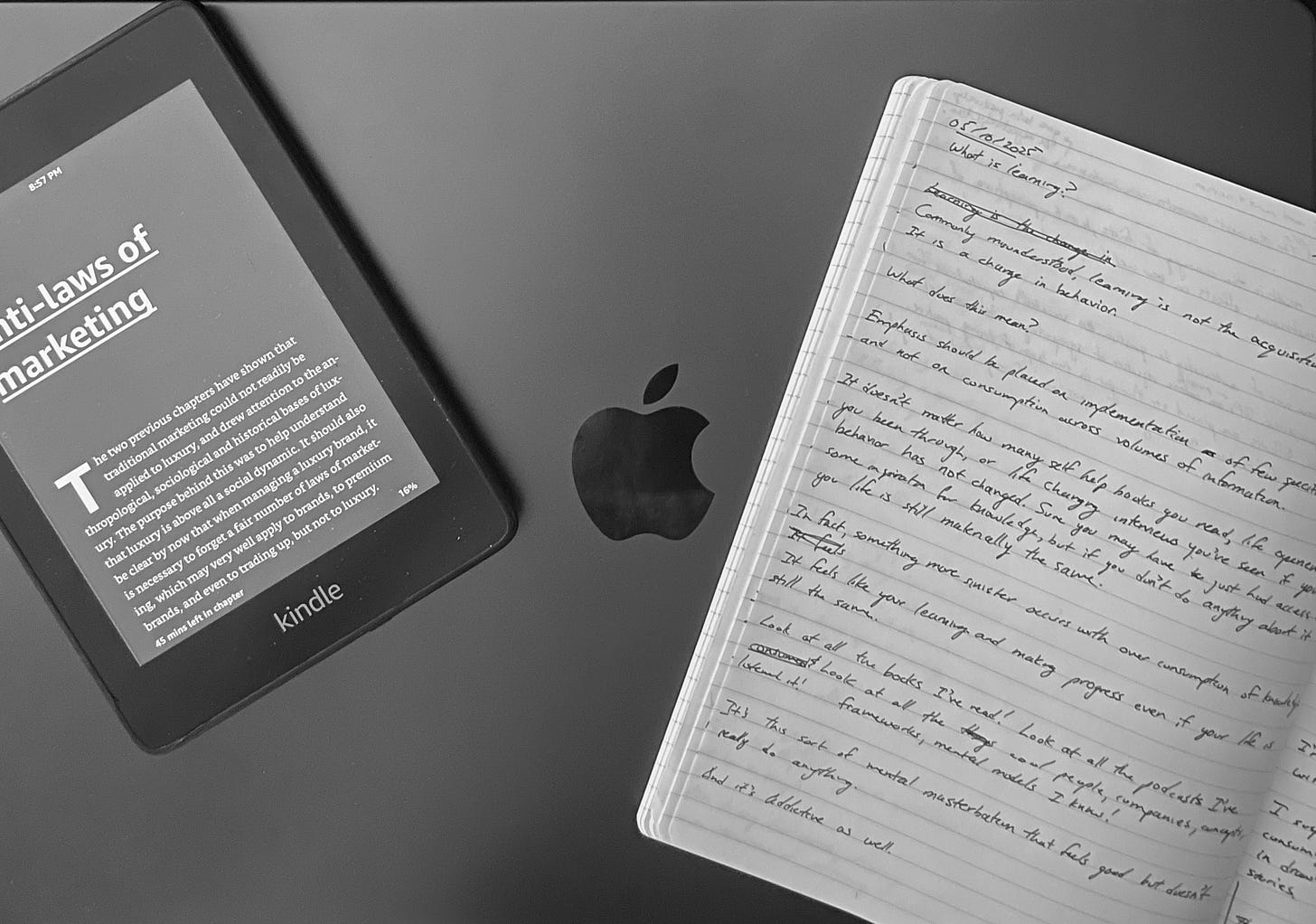Learning
Focus, repetition, and volume in an attempt to learn
What is learning?
Often misunderstood, learning is not just knowledge acquisition. It is also the change in behavior.
What does this mean?
Emphasis should be placed on implementation and not on overall information consumption.
It doesn’t matter how many self help books were read, the life experiences that were lived through, or the impactful interviews that were watched if behavior has not changed. Sure, there are a lot of cool nuggets of information there, but if nothing was acted upon, life is still materially the same.
What’s the point of reading, reflecting, or listening if no change comes of them?
Something more sinister also occurs with over consumption of knowledge.
The feeling that learning is being done and progress is being made even if life is still the same.
Look at all the books I’ve read! Look at all the podcasts I’ve listened to! Look at all the cool people, companies, conceptions, mental models I know!
It’s this sort of mental masturbation that feels good but doesn’t really do anything. It’s easier to believe progress is being made than actually making progress.
Oh. It’s addictive as well.
Another way I like to think about learning is inverting it.
Who are the type of people who do not learn?
Dummies do not learn (or idiots if I’m feeling mean).
What are the actions that dummies do?
It’s the common adage of “insanity is doing the same thing over and over again and expecting different results.”
They would repeatedly bang their heads against the wall and wonder why their head hurt. And while they may reflect on what is happening, they don’t change their course of action and reliably bang their heads against the wall again and again.
So how do I learn?
I have a belief that there is an under emphasis of consuming the same thing over and over again: reading the same books, listening to the same podcasts, and reflecting on the same life experiences.
While I’m not sure if there is some science backed study or anything, I find repetition over long periods of time eventually leads to action.
Through repetition, the knowledge I’ve acquired is not thrown into the cobweb corner of my brain. It’s actively being obsessed upon at seemingly all parts of the day.
When an opportunity comes for me to test what I’ve acquired, it’s quite difficult not to act in accordance with what I’ve been obsessively repeating for the past couple of months.
I also have a hunch that out of the many things that can be learned, only a few things really matter. Everything else is just noise and should be ignored.
There are countless examples of widely successful people who identified a handful of important concepts and maniacally chased after them.
Jeff Bezos focused on customer experience with Amazon. Sam Walton focused on cheap prices with Walmart. Todd Graves focused on quality of chicken fingers with Raising Cane’s.
And while these are business people, there is a common thread of focus that can be applied to life.
If I can identify and learn the few things that’s really important and ignore everything else, I bet I can find a lot of meaning in life, with a reward of high life satisfaction when I’m older.
Part of figuring out what’s important comes with age. It’s no mistake that biographies are usually written by and about older people. The compounding of wisdom needs a lot of time to do its magic.
Another part is based on content- books, podcasts, life experiences, long conversations with friends- being consumed. While I just wrote about how revisiting concepts is undervalued, I do not believe I should be actively restricting the amount of things I am consuming.
There should still be a sense of serendipity and “chasing butterflies”- aimlessly following curiosity and whatever is exceedingly interesting for extended moments.
By simply engaging with what I’m interested in, I automatically commit to repetition and offer myself the opportunity to identify patterns across many contexts.
And sometimes it’s the interesting things that become what should be focused on in the long haul.
All in a bid to not be a dummy.


